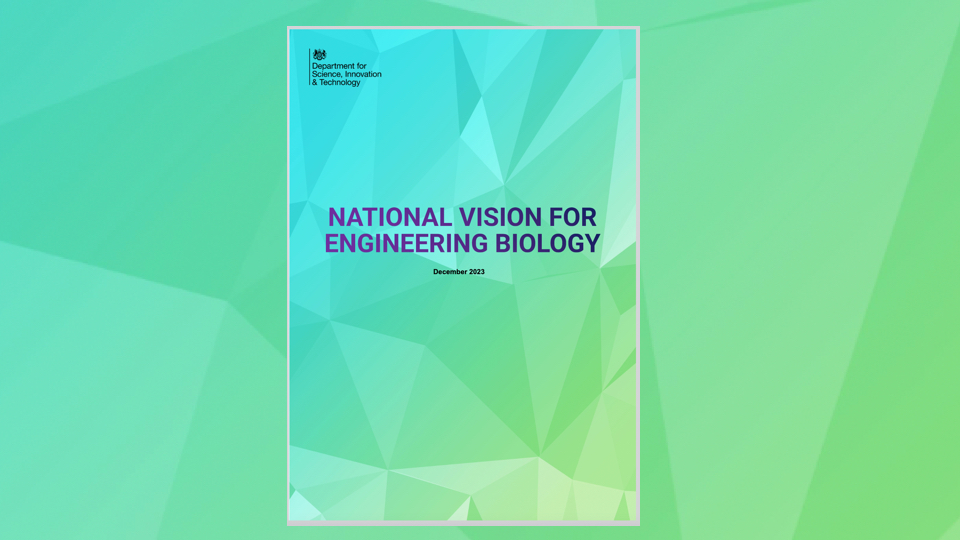
UK publishes £2bn vision for engineering biology
On the occasion of SynbiTECH in London, British Science, Research and Innovation Minister, Andrew Griffith, unveiled a £2bn strategic 10-year plan to foster engineering biology.
Following extensive engagement with industry and stakeholders, the new “National Vision for Engineering Biology” lays out the government’s strategy for turning the potential of cellular agriculture, New Genomic Techniques, medicinal advancements and sustainable fuel production into concrete benefits to the economy and people’s quality of life. The £10bn funding over the next decade together with the launch of a new Engineering Biology Steering Group is set to bolster economic growth in the UK and creating higher-paying jobs and opportunities across various industries throughout the country.
The vision is the application of rigorous engineering principles to biology, enabling the construction of new or redesigned biological systems, such as cells or proteins – which is already delivering breakthroughs, like lifesaving mRNA vaccines such as COVID vaccines, and has been identified as one of the five critical technologies being pursued by the government, as having the potential to grow at tremendous speed.
Though no budgets for the different application fields of synthetic biology have already been decided, according to Griffith, the (at least) 23 cellular agriculture companies. identified by the Good Food Institute across the UK celebrated the announcement that comes on the heels of investments of the UK Research and Innovation (UKRI) of £12m for a cultivated meat research hub and a total of £73m being invested?into Engineering Biology Missions Hubs and Mission Awards. Until April 2023, the Food Standards Agency (FSA) will publish new rules, proposed by Deloitte analysts, aimed to speed up the authorisation of Novel Foods in the UK, provide guidance and the option for pre-marketing tastings to companies. The ultimate goal is to close the gap to Singapore, which currently is the preferred place of European foodtech SMEs to launch her products.
Besides foodtech, the government will also double down on establishing the UK as a world leader in responsible engineering biology innovation by 2030, where we work with industry and global partners to not only seize its benefits but also ensure potential risks are effectively addressed. This includes investing in world-class R&D and in the infrastructure needed to boost innovation and scale it up, ensuring regulation helps engineering biology-derived products reach market, and securing the skills and infrastructure necessary for the UK to spearhead global advancements in transformative technologies.
An Engineering Biology Steering Group is also being launched, bringing policymakers together with the business leaders and innovators behind transformational engineering biology breakthroughs being made in the UK, to steer the government’s approach to this technology.
As part of the launch of the Vision, Science Minister Griffith will also tour bit.bio, a synthetic biology company focused on human stem cell differentiation in Cambridge, co-founded by Mark Kotter, who recently gave a compelling keynote lecture for the first Austrian Biotech Summit in Graz and who wants (for example) to “democratize stem cell manufacturing”. bit.bio programs cells to become mature, functional human cells for research, drug discovery and cell therapies. During the visit, the Minister will officially open a new wing for their laboratory facilities, expanding their research centre, signalling the collaboration between the government and prominent industry players in the sector. This follows a speech at one of the field’s leading conferences, SynbiTECH in London where he will unveil the Vision to the audience
This new programme builds on the £3.5 billion injection to make the UK a science and technology superpower announced in this year’s Spring Budget. This is delivering a £2.5 billion Quantum Strategy which will bring new investment, fast-growing businesses and high-quality jobs to the UK, cementing its reputation as a top location to commercialise quantum; and £1 billion to create the next generation of supercomputing and AI research to establish the UK as a science and technology superpower.
Science Secretary Michelle Donelan said: “Engineering Biology has the potential to redefine our world in ways that were previously unimaginable. Today’s £2 billion commitment not only reflects our determination to push the boundaries of what UK science can achieve, from transforming medicine to tackling climate change, but also champions the five critical technologies that will define our future.”
In summary the UK are pushing a £6bn strategy in biomedicine and tech innovation forward which was first announced in April this year. One may ask whether the money for such an effort is available because of Brexit or whether it is just needed to overcome the economic troubles of a stand alone island in the northern seas.
see: https://www.gov.uk/government/publications/national-vision-for-engineering-biology



 Unsplash+
Unsplash+